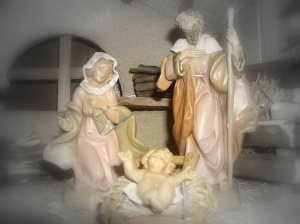Our first year on the mission field was spent in the classroom learning Spanish. Sometimes our brains would hit a wall and we’d get so frustrated. How could we reach a nation if we couldn’t even speak the language.
Our Spanish professor would consistently remind us, “Es un proceso” (“It’s a process”).
Many believe the doctrine of sanctification is like that…a process in which we become more holy as we grow in our Christian experience. And while that’s partially true, that’s not all there is to biblical sanctification.
The word sanctify or sanctification means to be set apart or dedicated to God. In fact, the words sanctify, saint and holy all carry the same basic root and definition. They all mean to be set apart or dedicated unto God.
If we’ve been born again, we’ve been set apart unto Him – sanctified – we’re saints – and He sees us as holy.
There are three aspects to sanctification. They are Positional Sanctification, Progressive (or Experiential) Sanctification and Ultimate Sanctification.
Positional Sancatification – Being set apart by God and for God whereby He sees us as holy and wholly His regardless of our conduct. Positional Sanctification takes place when we trust Christ as our Savior and Lord, accepting what He did on the cross in payment for our sin.
“And in accordance with this will [of God], we have been made holy (consecrated and sanctified) through the offering made once for all of the body of Jesus Christ (the Anointed One).” Hebrews 10:10 Amplified
Notice the tense of the verb used in Hebrews 10:10: have been made holy – it’s used in the perfect tense meaning it’s a completed work that happened in time past and cannot be changed.
From God’s perspective, we have been set apart, we have been made holy, we have been sanctified. It was a once and for all event that altered our eternal destiny.
How humbling and reassuring to know that we’ve been sanctified through the offering of the body of Christ…once for all. Our position doesn’t depend upon our works, our faithfulness, our godliness or our own strength. It’s a divine work in which God sets us apart for Himself – once and for all.
Progressive (or Experiential) Sanctification – The continual growing process in the life of a Christian whereby we set ourselves apart for God and allow Him to have His way in our hearts and lives. It is a constant yielding of ourselves unto God and to His will. This is what we normally think of when we think of Sanctification…it’s a process (es un proceso).
The Old Testament sacrificial system mirrors the concept of Progressive Sanctification. God’s people would ‘set apart’ their offering and present it unto the Lord. That ‘sanctification’ is echoed in Romans 12:1,2 and Romans 6:13 with the phrases, “yield yourselves’ and ‘present yourselves’.
We set ourselves apart by an act of our will so that we can be led by the Holy Spirit and be changed from one degree of glory to the next (2 Corinthians 3:18).
Positional Sanctification never changes. Progressive Sanctification never stops changing as long as we’re alive.
Ultimate Sanctification – When we die we will see Jesus as He is and we’ll be like Him. Sinless – deathless and brought to full spiritual maturity.
1 John 3:2 says, “Beloved, now we are children of God; and it has not yet been revealed what we shall be, but we know that when He is revealed, we shall be like Him, for we shall see Him as He is.”
And in Jude, we’re told that one day He will present us faultless before the presence of His glory. That’s Ultimate Sanctification.
Yes, sanctification is a process, but it’s oh-so-much more!
How does understanding the Positional, Progressive and Ultimate Sanctification help you in your Christian walk?









